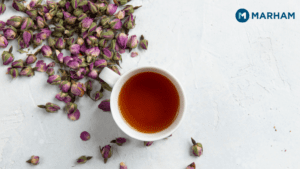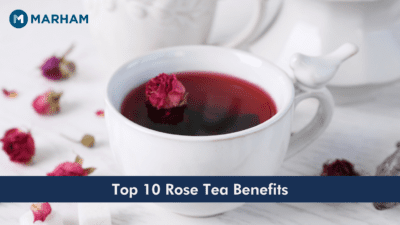Roses are one of the oldest flowers and are used in numerous ways to benefit mankind. From benefitting skin to overall health, it has potential benefits. It is also used in many foods and to make rose tea. You’ll be surprised to know how rose tea benefits boost your health.
Highlights:
- Rose is also used to make rose tea which is an aromatic herbal beverage.
- Rose petals in tea may have originated in China.
- Whether you want clear skin or want to boost your immunity, rose tea benefits are undeniable.
- Rose tea is beneficial for women having menstrual pain and associated symptoms.
For thousands of years, roses have been used for medicinal, cultural, and art purposes.
The rose family has approximately 130 species and thousands of cultivators around the world.
All roses are edible and can be used in the kitchen to make numerous dishes and drinks. Moreover, some varieties of roses are bitter while others are sweet.
Rose is also used to make rose tea which is an aromatic herbal beverage. It is made from the fragrant sweet petals and buds of a rose.
Rose petals in tea may have originated in China. Moreover, rose tea is an essential part of Traditional Chinese Medicine (TCM) which is used to regulate Qi.
Traditional Chinese Medicine (TCM) also regards rose tea as a beneficial remedy for the following:
- Stomach and Digestive Problems
- Menstrual Cramps
- Menopausal Symptoms
- Mood Swings
- Irritability
- Improving Sleep and Fatigue
In this blog post, we will delve into the nutritional content of the rose tea and its potential benefits. Moreover, we will also look into the potential risks of rose tea. And finally, we will tell you how to make a delicious rose tea.
You can also consult the best nutritionist in Pakistan via Marham.pk, if you want to learn more about any type of food or want to have a diet plan.
Nutritional Information
The dried rose petals powder has the following:
- Calcium: 120 mg
- Protein: 0.5 grams
- Fat: 0.2 grams
- Carbohydrates: 70.4 grams
- Iron: 3.7 mg
- Vitamin C: 0.2 mg
- Crude Fiber: 1.2 grams
- Ash: 0.4 grams
- Moisture: 84.5%
Rose petals are also an excellent source of:
- Vitamin A
- Vitamin C
- Vitamin E
- Phytonutrients
- Antioxidants
- Calcium
- Iron
Moreover, rose petals have phytochemicals that can help stop the formation of cancer cells and provide protection against cancer-like changes.
10 Potential Rose Tea Benefits
Here are 10 potential and undeniable rose tea benefits:
1. Make the Immune System Strong
In the fight against sniffles and germs, rose tea can be a superhero wearing a cape.
Rose tea has a high amount of antioxidants and vitamin C which are important for the healing process of the body. Moreover, they also can fight off germs and infections.
Antioxidants present in rose tea can also boost immunity and make the immune system stronger. A study reported that rose tea can also relieve flu-like symptoms such as congestion, cough, or common cold.
Therefore, sip away the rose tea and let it be your secret weapon in fighting off the germs.
Some research also indicates that the aroma of rose tea can also lessen anxiety and stress levels. Stress can lessen the immunity of the body and elevate the chance of getting sick. Hence, consuming rose tea can help in reducing stress which will boost immunity.
2. Lower Risk of Chronic Disease
Rose petals have antioxidants and polyphenols that work in a way to provides protection to the body from cell damage.
Antioxidants are compounds that help in protecting the body against the effects of free radicals.
The main source of antioxidants in the rose is polyphenols.
Polyphenols have been shown to lessen the risk of diabetes, type 2 diabetes, heart disease, cognitive diseases, and obesity.
Moreover, rose tea is also enriched with gallic aid. Gallic acid is also an antioxidant compound that accounts for 10-55% of the total phenol content of the tea. It is known to have antimicrobial, anticancer, analgesic, and anti-inflammatory effects.
The tea also has anthocyanins which make up approximately 10% of its total phenol content. Anthocyanins are colored pigments that are affiliated with eye health, urinary tract, healthy aging, improved memory, and also lower the risk of some cancers.
Other phenolic compounds that contribute to the antioxidant activity in rose tea are quercetin and kaempferol.
3. Menstrual Cramp Relief
Menstrual pain and cramps affect approximately 50% of girls and women. Some of them experience fatigue, vomiting, headaches, back pain, diarrhea, or dizziness during periods.
To get relief from these symptoms, many women go for alternative methods to control pain over regular pain medicines.
For instance, rose tea which is made from the leaves or buds of Rosa gallica has been used in Traditional Chinese Medicine to alleviate menstrual pain.
This is because rose tea has anti-inflammatory effects and vitamins which can aid in reducing menstrual pain or dysmenorrhea.
A study conducted in 2005 found that women who consumed rose tea had a major reduction in cramping, pain, bloating, mood swings, and anxiety. This suggests that rose tea might be a better way to treat menstrual pain and symptoms.
4. Anti-Inflammatory Properties
A study reported that the anti-inflammatory activity in rose petals powder is as effective as ibuprofen or aspirin. Rose tea can also prevent pain caused by inflammation from conditions such as arthritis or physical injury.
Moreover, more research is needed to understand the anti-arthritic properties of roses for humans.
As inflammation can cause gain in weight with time, thus these anti-inflammatory properties verify weight loss due to rose tea.
Additionally, rose tea has natural terpenes which can aid in reducing inflammation and promoting a sense of well-being.
5. Aids Digestion
One of the traditional rose tea benefits is to treat stomach issues.
Rose tea can help in stimulating digestive juices for the breakdown of food. It aids the body to absorb more nutrients from the food. It also makes the overall digestive process efficient.
Moreover, some modern research reported that rose tea can treat stomach issues due to its ability to increase the liver’s bile production.
This all aids our body in digesting food easily, improves nutrient absorption, and prevents constipation.
6. Hydration and Weight Management
Rose tea is made from water. Due to this, consuming one or more cups of rose tea per day can immensely contribute to the total water intake.
Not drinking plenty of water can cause dehydration which can result in headaches, fatigue, muscle cramps, skin problems, rapid heart rate, and low blood pressure.
Therefore, it is essential to consume plenty of water every day. One can eat water-rich foods or other water beverages.
Moreover, water can also contribute to weight loss by boosting the metabolism.
Research conducted in 2003 has shown that consuming 500 ml (17 Ounces) of water can increase the metabolism by up to 30%.
Moreover, drinking more water before meals can help in weight loss by giving you a feeling of full stomach and reducing the calorie intake.
In the end, enough water intake can also aid in preventing kidney stones.
7. Healthy Skin and Hair
Rosehips are reported to boost healthy skin by enhancing cell longevity and lessening the aging signs.
Rose tea can also improve hydration which will eventually make the skin clear, radiant, and flawless.
Moreover, rose tea is rich in Vitamin E and Vitamin C which can reduce wrinkles and sunburns. It can also reduce the hair loss issues.
8. Lower Blood Pressure
Rose tea can also prevent high blood pressure, improve blood circulation, and reduce cholesterol levels. High blood pressure can damage the blood circulation and organs if left untreated. It also increases the risk of heart attacks and strokes.
The tea can actively contribute to lessening the risk of cardiovascular diseases. Hence, it lowers blood pressure and maintains a healthy cardiovascular system.
9. Healthy Heart
Rose tea has some compounds that are associated with cardiovascular health benefits.
They aid in lowering blood pressure, improving blood circulation, and reducing cholesterol levels.
Moreover, a recent study found that women who take an antioxidant-rich diet have a reduced risk of heart attack by 20%. It also has antioxidants which can lower the risk of cancer.
10. Substitute of Caffeine
Many hot beverages such as hot chocolate, tea, coffee, etc have caffeine.
Caffeine provides many pros such as increased alertness, energy levels, and reduced fatigue. Some people avoid caffeine as they are unable to tolerate the side effects of caffeine.
For example, caffeine can increase blood pressure, irritability, and jitter, and cause anxiety in some people.
However, rose tea is caffeine-free and can be an excellent substitute for some caffeinated and hot beverages.
Moreover, one should keep in mind that some rose teas are a combination of rose petals and regular caffeinated tea. Therefore, if you want to go for caffeine-free rose tea, then you should choose 100% rose petal tea.
Potential Risks of Rose Tea
As the nutritional content of rose tea can provide health benefits, it can also cause problems for people having medical conditions. Therefore, people with health issues need to consult a doctor before incorporating it into their diet.
Some of the warnings and precautions associated with rose tea are as follows:
-
Medicine Interaction
Rose tea can interact with some medicines including, antidepressants or blood thinners. Therefore, people taking any sort of medication should consult with a doctor before taking rose tea.
-
Allergies and Asthma
Some people are allergic to rose plants or have asthma. They should avoid taking rose tea. A study found that rose hip allergens can cause asthma development.
-
High Vitamin C Content
Rose tea has Vitamin C and taking too much of vitamin C can cause nausea, diarrhea, heartburn, and headaches.
In some people, a high quantity of vitamin C can also cause kidney stones.
-
Pregnancy Concerns
Currently, there is no research done on the safety of rose tea consumption by pregnant women.
How to Make Rose Tea?
To make a delicious rose tea you should follow the steps mentioned below:
- Get a fresh rose and pluck its petals.
- Wash the petals thoroughly.
- Add a cup of water to a saucepan and add rose petals to it.
- When the water starts to boil simmer it for 5 minutes and wait until the color of the petals completely goes into the water.
- Finally, use a stainer to strain the tea.
- Enjoy a delicious cup of rose tea!


Final Words
Besides serving cultural, beautification, or other purposes, roses have many undeniable medicinal purposes.
Rose tea which is made from rose petals (mainly) has numerous health benefits to humans.
However, if you’re allergic to roses or have any underlying medical condition, then you should avoid taking rose tea. It is preferred to consult the best nutritionist in Pakistan to get advice on it.
Frequently Asked Questions (FAQs)
Yes. Rose tea is made up of water. Therefore, drinking one or more cups every day can immensely contribute to total water intake.
Rose tea has a calming effect on the mind and body. Moreover, rose petals are naturally sedative which makes rose tea a perfect beverage to drink at night time.

